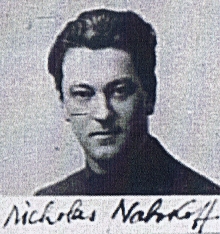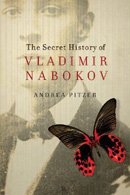From the USSR to the OSS: Nicholas Nabokov’s naturalization file
Next up in the Records series of archival material is the naturalization paperwork of Nicholas Nabokov. Nicholas was Vladimir Nabokov’s first cousin on his father’s side. A classical music composer who studied at the Sorbonne, he worked with several legendary cultural figures, including Ballets Russes founder Sergei Diaghilev.
Nicholas came to America in 1933, several years before Vladimir and Véra’s crossing. By the time of his naturalization in 1939, Nicholas Nabokov and his first wife—Russian princess Nathalie Shakhovskoy—had divorced, and he had remarried. His second wife, Constance Holladay, whom he listed as his spouse on his application for naturalization, was a U.S. citizen by birth. Nicholas would go on to have five wives in all before his death in 1978.
 Other items in his file are of more historic interest. His certificate of US citizenship lists his former nationality as the “Union of Soviet Socialist Republics.” While Nicholas had been born in 1903 on Polish territory in the Russian Empire, he had fled his homeland at the same time that his cousin Vladimir escaped in 1919. And the Soviet Union was officially formed at the end of 1922.
Other items in his file are of more historic interest. His certificate of US citizenship lists his former nationality as the “Union of Soviet Socialist Republics.” While Nicholas had been born in 1903 on Polish territory in the Russian Empire, he had fled his homeland at the same time that his cousin Vladimir escaped in 1919. And the Soviet Union was officially formed at the end of 1922.
I suspected that he had said his nationality was Russian, and that a clerk had typed the USSR entry in error. But just in case, last year I asked my Russian research assistant to file an inquiry into whether Nicholas Nabokov had ever actually become a citizen of the USSR. It seemed highly unlikely, but there were unsubstantiated statements in his FBI file about his trying to return to Russia under Stalin, so I wanted to follow up. To date, nothing has appeared that suggests the USSR entry is anything but a mistake.
Office of Strategic Services
Perhaps the most interesting pages in Nicholas’ file are two requests made by the Office of Strategic Services in July and August of 1944 for his naturalization information. The OSS was responsible for coordinating military intelligence during the war, and was the forerunner of the CIA.
What is not mentioned in the file is that these requests were likely made to clear him for work with the staff of the US Strategic Bombing Survey. The Survey was established that November by the Secretary of War to assess the effectiveness of Allied air strikes.
More than 1,000 people were involved, many of whom followed directly behind Allied forces as they swept through Germany in the closing months of the war. They dug up military records in all kinds of unusual places—in caves, in a hen house, and even in coffins. Material was gathered in the field and sent to London and Washington for review by people like Nicholas, who was an analyst on the project for several months.
Nicholas knew several languages and had lived in Berlin and Paris before the war. He was an ideal asset for the American government, but he remained a music professor at various American colleges well into the 1940s. The request from the OSS is the only reference to any strategic or intelligence-related matters in his naturalization records.
Yet by the time Nicholas Nabokov got involved with the Strategic Bombing Survey, he had already done classified work for the US government. And after the war, he would move on to play a much stranger role in a clandestine American intelligence project—a project that would be exposed decades later amid international outrage. All of which is further explored in The Secret History.
